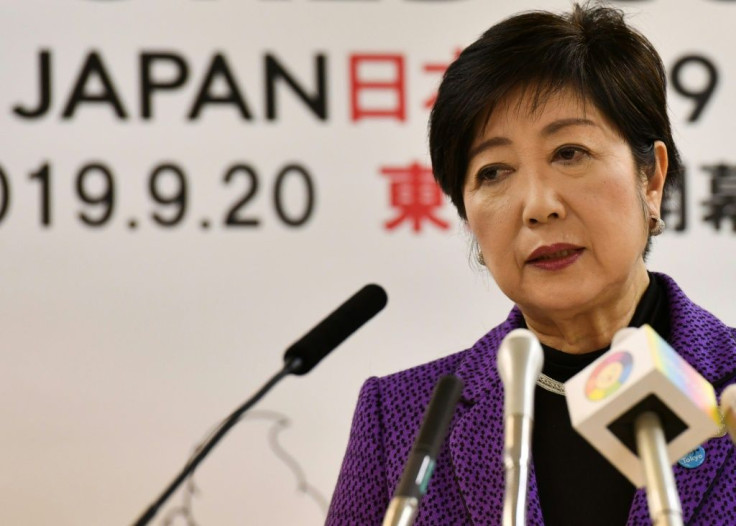Tokyo Sees Sudden Spike In Coronavirus Cases, Creating Concern About Potential Spread

KEY POINTS
- Japan will ban the entry of foreigners from 21 European countries, as well as Iran
- More than 200 people have tested positive for the virus in Tokyo
- About 54 have died in Japan from the virus.
Tokyo recorded at least 47 new cases of coronavirus on Thursday -- the biggest single-day increase thus far – raising fears of wider infections in the megacity of almost 14 million people.
Tokyo Governor Yuriko Koike pleaded with the city’s residents to avoid unnecessary trips, remain indoors and self-quarantine. As in other countries, Koike’s order prompted panic buying of food and staples by the public.
“We are seeing an increasing number of individuals testing positive as of this week,” Koike said at a news conference.
While Japan has only recorded about 2,000 coronavirus infections in total – including 700 people who were infected on the Diamond Princess cruise ship – health officials fear a rapid spread. About 54 have died in Japan from the virus.
Koike further warned that Tokyo was at a critical juncture and perhaps on the brink of an explosion of new cases. Most worryingly, the source of some of the confirmed cases cannot be traced.
On Tuesday, Tokyo surpassed the northern main island of Hokkaido as the Japanese prefecture with the most infections.
Thus far, more than 200 people have tested positive for the virus in Tokyo. The Health Ministry estimated that Tokyo could have up to 530 positive cases by April 8.
"We've entered the second wave of infections which completely differs from January through February," the ministry said.
Koike said on Monday that a citywide lockdown might become “the only option left” if other measures to halt the spread of the virus fail.
The Japanese government on Wednesday advised its people to avoid all nonessential overseas travel.
The Chiba, Gunma, Tochigi and Yamanashi prefectures advised their residents to avoid travelling to Tokyo over the weekend. Typically, more than 2.8 million people commute to Tokyo from seven nearby prefectures on any given weekday.
"Protecting the capital means protecting Japan," Koike said.
Thus far, Japan has not declared a state of emergency although Prime Minister Shinzo Abe has formed a panel to study such a move.
“The prime minister instructed me to move ahead quickly with the establishment of the panel,” said Economy Minister Yasutoshi Nishimura, adding the government is not currently considering calling an emergency yet.
“This is an extremely important time for avoiding a sudden spread of the infection,” Chief Cabinet Secretary Yoshihide Suga said.
Abe has called the situation a "national crisis" and has already postponed the Tokyo Summer Olympics. Authorities have also closed schools and cancelled various sports and entertainment events. Many retailers have also halted operations.
"To overcome this situation that could be described as a national crisis, it's necessary for the government, local entities, medical workers, businesses and the people of Japan to beef up measures against the virus," Abe said.
Some experts think Japan has yet to take the crisis seriously.
“Everyone thinks it’s calmed down in Japan, and there’s a big gap between that and how we feel,” said Hitoshi Oshitani, a virology professor at Tohoku University. “That’s what makes the coronavirus extremely difficult.”
Separately, Japan will ban the entry of foreigners from 21 European countries, including Italy and German, as well as Iran.
Japan has already prohibited travelers from parts of China and South Korea.
Abe also said Japan will ask visitors from some countries in Southeast Asia, the Middle East and Africa -- including Indonesia, Singapore, Thailand, Israel and Qatar -- to self-quarantine for 14 days.
© Copyright IBTimes 2025. All rights reserved.





















